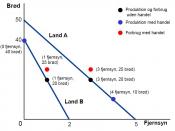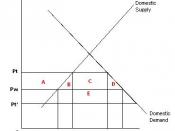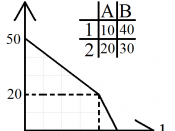This paper will present decisions taken in four international trade scenarios along with the decision results. The advantages and limitations of each scenario will also be examined. This paper will also present four key points from the reading assignments that were emphasized in the simulation. The paper concludes by explaining how some of the simulations concepts can be applied to this author's workplace.
International Trade Advantages and LimitationsIn scenario one, Rodamia wants to determine the possibilities of trade opportunities with Alfazia, Uthania and Suntize. Rodamia interest is in exporting product that Rodamia produces efficiently, and importing products that it is not efficient in producing. Rodamia's cheese and DVD players were the potential export products. Suntize's comparative advantage is in electronics thus importing watches from Suntize. Uthania is also a good choice because Uthania grows corn at a much lower cost than Rodamia. Suntize and Uthania were the countries chosen in this scenario for Rodamia to begin trading.
The advantages of the choices are the opportunity cost presented by the product of each country. This results in each country being able to optimize in products that each cannot produce efficiently. The limitations of the choices are isolated to technology. Both Rodamia and Suntize must continuously produce both high volume and innovative products in order to avoid competition of from other countries. Below are the results from scenario one.
Jan 2xx4ImportsTrade PartnerDomestic Production and ExportsCheeseCornUthaniaDVD PlayersWatchesSuntizeIn scenario two, Suntize has been importing watches into Rodamia at prices lower than Suntize's home market. The Trade Representative Office of Rodamia needs to determine whether to impose trade restrictions with Suntize. In international trade "when one country exports a significant amount of goods to another country at prices much lower than in the domestic market." (Dumping, n.d., para. 1). The decision made was to impose...


